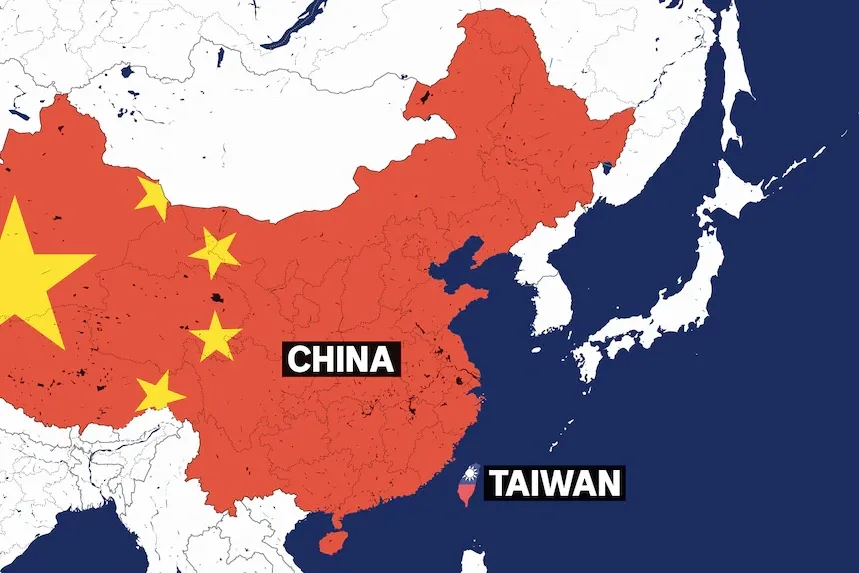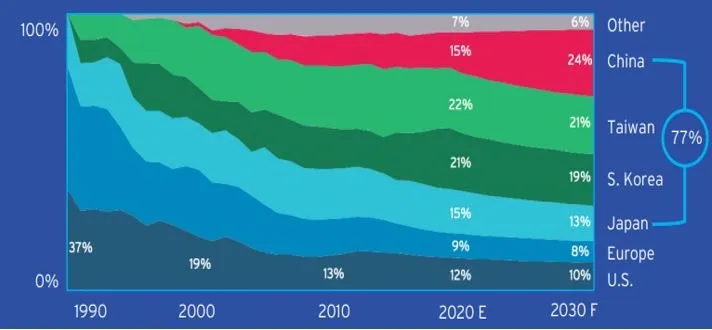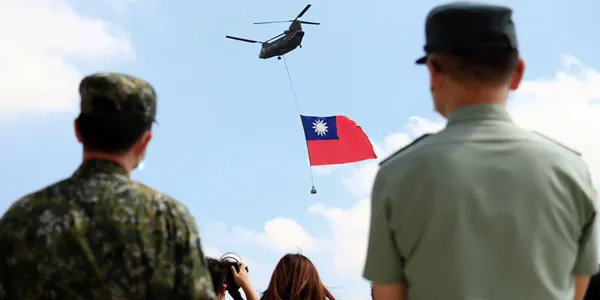Word Key:
- Taiwan = Republic of China (ROC) = Democratically elected government in Taipei (only unofficial U.S. ties, no UN membership)
- China = People’s Republic of China (PRC) = Chinese Communist Party (CCP) in Beijing (maintains official U.S. ties, on UN Security Council)
What is the status of Taiwan?
- As the decades-long Chinese Civil War ended in 1949, the nationalists fled to the island of Taiwan and governed as the Republic of China (ROC). The rival communists won control over mainland China and governed as the People’s Republic of China (PRC). In 1972, President Nixon recognized and established relations with the PRC as the sole rulers of mainland China.
- Nixon ended official political ties with the Republic of China (Taiwan), which quickly resulted in the PRC replacing the ROC on Taiwan from their seat at the United Nations and turning U.S.-Taiwan relations unofficial.
- The United States has since maintained a One-China policy, recognizing Beijing as China’s sole capital, but opposing any unilateral changes to the status quo from either side and calling for cross-strait differences to be resolved by peaceful means.
- As a result, the United States does not have official relations (an ambassador or embassy) with Taiwan, but it holds strong un-official economic and diplomatic partnerships with the island. Members of Congress and senior Executive Branch officials occasionally visit.
- The United States officially does not support Taiwanese independence. CCP General Secretary Xi Jinping has numerously stated that he will “smash formal attempts for Taiwan’s independence.

What is the Chinese Communist Party’s interest with Taiwan?
- The CCP insists that the sovereign nation of Taiwan—today a free and prosperous democracy—has always been and must remain part of China and threatens “reunification” by military force.
- In July 2021, on the 100th anniversary of the Chinese Communist Party, Xi Jinping proclaimed that “We must take resolute action to utterly defeat any attempt toward Taiwan Independence.” Xi outlined Taiwan’s reunification with the PRC as a fundamental piece of China’s “national rejuvenation by 2049.”
- The CCP accompanied its rhetoric with action—over the course of the past two years, the CCP has significantly increased use of its Air Force to intimidate Taiwan by aggressively flying military planes in Taiwan’s Air Defense Identification Zone and is developing the power to overwhelm the island in a potential conflict.
What are the U.S. legal obligations to Taiwan?
- The Chinese Communist Party repeatedly declares that Taiwan is part of China, and any attempt by the United States to recognize Taiwan’s independence could trigger a military response.
- To preserve peace in the region and maintain successful economic partnerships, the United States has held to the One-China policy, and refuses to officially recognize Taiwan as an independent nation. Though U.S. political rhetoric emphasizes Taiwan’s sovereignty, an official recognition could invite a stern CCP response.
- Our stance toward Taiwan is known as strategic ambiguity—while we treat Taiwan as an independent nation, we refuse to officially acknowledge its independence.
- Strategic ambiguity also forms our military posture—we have not officially declared whether we would defend Taiwan in the event of a war, which dissuades China’s military provocation of Taiwan.
- However, the United States is bound to the Taiwan Relations Act of 1979 that establishes unofficial diplomatic relations with Taiwan and stipulates that the U.S. shall provide Taiwan arms of a “defensive character.”
- President Biden declared on multiple occasions that the United States would defend Taiwan in a conflict with China, but his staff have walked back those statements by returning to the policy status quo.
- Biden shouldn’t have to be corrected by his staff all the time. But far more important than the rhetoric of supporting Taiwan is providing military spending to back that commitment up. We need to give our military all the tools they need to push back against China – not defund the military like Biden’s budget tries.
What are U.S. interests in Taiwan, and should we help defend them?
- China’s growing authoritarian role in the world runs directly counter to U.S. interests and our security— their dangerous ambition to rule the world as they see fit is a direct threat to U.S. security, our interests, and the interest of freedom in the world. Taking over Taiwan would be a crucial first step in the CCP’s long-term plan and endanger the United States immensely.
- The United States successfully maintains regional power in Southeast Asia, along with our allies, Australia, South Korea, and Japan. Together, the alliance helps deters China’s authoritarian claims over Taiwan and the South China Sea along with its mandate to protect freedom in the region.
- Taiwan produces 63 percent of semiconductors used in the United States, a critical component in almost every electronic device, and particularly important amidst a world-wide shortage.
- Should the CCP gain control of the island, it would control 40 percent of global semiconductor manufacturing capacity and become the world’s technology leader.
- As result, not only does Taiwan represent an important symbol of America’s commitment to a rules-based international order, but it is a key enabler of American economic security as well. Just think of how the chips shortage has hurt the car industry. Now imagine China controlling the global chips industry – they would have unacceptable leverage over the United States.
- The best way to protect Taiwan is to make sure there’s never a war over the country in the first place. The only way to do that is to make sure Taiwan and the U.S. have a military strong enough to deter China from starting a war. That requires a strong commitment to our military, but Biden is trying to cut defense spending instead of increasing it – while he increases spending on every other category.
- The U.S. already unofficially supports the Taiwanese military with crucial training—though publicly sells elite military equipment and missile defense systems to Taiwan.
SEMI-CONDUCTOR PRODUCTION BY COUNTRY

Back to the Basics
- Taiwan is our first line of defense against China.
- Taiwan is a friend to America, it is a strong democracy, and we should always stand with our allies and against our enemies. We must not let another country fall to dictators, because they will come after us next.
- First, we must do no harm. The United States must not allow China to buy more American companies and steal more American technology that it will use to attack Taiwan.
- The United States needs to ensure that China does not take Taiwan. First, we should send Taiwan plenty of defensive weapons so that it can do to China what Ukraine is doing to Russia now. China will only attack if it thinks it can get away with it.
- But American taxpayers shouldn’t foot the whole bill. We need to encourage Taiwan to spend more on their defense now, and to buy the right weapons from us. And we should ask our allies in Japan, South Korea, and Australia to share the burden with us too.
- Finally, we need to fully fund our military so we can position ourselves in the Pacific Ocean to be ready to stop the war. We need to rebuild and fully fund our Navy, not cut it like President Biden wants to do.

